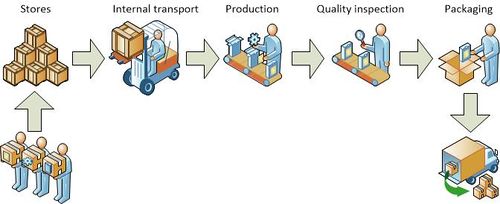Production process
| Production process |
|---|
| See also |
Production process is a complex of phenomena and activities that involve materials and goods gradually undergoing changes. They cause successive development of features of products, directed by its intended use. The end of the production process occurs when all the necessary features of given product have been achieved.
Types of production processes
There are different types of production processes:
- Production line - production is arranged so that product is moved sequentially from one workplace to another.
- Continuous flow - type of production line, where product cannot be removed (e.g. steel casting line, glass production).
- Custom manufacturing - products are manufactured based on custom customer requirements. Production is divided into dedicated areas (e.g. painting area, welding area)
- Fixed position manufacturing - the product doesn't move during the production process (e.g. ship).
Classification of production processes
The classification of the production processes depend on the nature of the activities. There are:
- technological processes,
- direct impact processes,
- natural processes,
- measurement and inspection processes, e.g. quality inspection
- transport processes,
- external transport,
- internal transport,
- storage processes.
Technological process
During the technological process activities are carried out, the purpose of which is to change the character of the raw material into the finished product. Technological process is divided also into subtypes. The first is the process of direct impact. It consists of all actions carried auto by employees directly on raw material of pre-processed item (e.g.. shaping a piece of metal by hammer in the forge).
Functions of production processes
Another type of production processes classification is division depending on the way in which they are associated with the product development. There are:
- primary production processes
- secondary production processes
- support processes
- waste utilization processes
Stock compensation for optimal production flow
Compensating stocks are created for processes with small share in the value of production to prevent any production disturbances. Managers strive to minimize the cost of production in the course of the process but in the same time, maintaining undisturbed production cycle. For about 10% of total production, managers go in the other direction to compensate for the disturbances, namely, they apply greater detail of planning and regulation.
The accuracy of the control can be directed on all items, selected number of them, or on some workstations. Selection of items that require an accurate control is made using Pareto curve analysis. The flow of the selected items should be controlled by all positions in the production process. The remaining groups of items can be controlled only on few key positions.
The next factor in the accuracy of the control is the level of stability. At this stage managers need to confine themselves to qualitative assessment, because the stability of production is difficult to determine in a more measurable way.
Frequency of control is another way of reducing possibility and impact of disturbances in production processes. This analysis can be carried out from the point of view of efficiency of management of the production process.
See also:
References
- Bardhan, I., Whitaker, J., & Mithas, S. (2006). Information technology, production process outsourcing, and manufacturing plant performance. Journal of Management Information Systems, 23(2), 13-40.
- Lee, H. L., & Rosenblatt, M. J. (1987). Simultaneous determination of production cycle and inspection schedules in a production system. Management science, 33(9), 1125-1136.
- Levy, F. K. (1965). Adaptation in the production process. Management Science, 11(6), B-136.
- Morroni, M. (2009). Production process and technical change. Cambridge university press.
- Schonberger, R. J. (2007). Japanese production management: an evolution—with mixed success. Journal of Operations Management, 25(2), 403-419.
